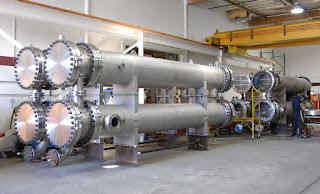The Heat Exchanger Market Is Anticipated To Witness High Growth Owing To Rising Demand For Energy Efficiency
 |
| Heat Exchanger Market |
The heat exchanger market refers to equipment that transfers
heat between two or more fluids without physical contact. The core function of
heat exchangers is to transfer heat from a hot fluid to a cold fluid. Some
common types of heat exchangers include shell and tube heat exchangers, air
cooled heat exchangers, double pipe heat exchangers, plate heat exchangers and
others. Heat exchangers find widespread applications across various industries
such as chemical processing, petrochemical, oil and gas, HVAC, power generation
and others. They help improve energy efficiency of industrial processes by
recovering waste heat and reducing utility costs. The need for heat exchangers
is increasing due to stringent environmental regulations regarding carbon
emissions and growing focus on optimizing plant operations. The Global heat
exchanger market is estimated to be valued at US$ 21714.26 Bn in 2024 and is
expected to exhibit a CAGR of 22.%
over the forecast period 2024 to 2031.
Key Takeaways
Key players operating in the heat exchanger market are Bytedance, Amazon.com
Inc., Meta Platforms Inc., Alphabet Inc., Spotify AB, Netflix Inc., Snap Inc.,
Twitter Inc., Pinterest, Etsy, Shopify, Patreon, OnlyFans, Teespring, Twitch
Interactive, Discord, Cameo, TikTok, YouTube, and Instagram. These players are
focusing on expanding their product portfolio and global footprint through
mergers and acquisitions.
The key opportunities in the heat exchanger market include rising uptake in
process industries, growing penetration in building automation and increased
investments in renewable energy plants. Developing economies in Asia Pacific
and Middle East are expected to drive significant demand.
The major players are strategizing global expansion through partnerships, joint
ventures and new manufacturing plants across China, India, Middle East and
Southeast Asian countries. Local production helps address trade policies and
tariffs while catering to the specific requirements of regional customers.
Market Drivers
One of the key drivers for the heat exchanger market is the rising demand for
energy efficiency in industrial processes. Heat exchangers help recover waste
heat and optimize thermal efficiency of plants. Their use helps lower energy
bills and reduce carbon footprint significantly. With growing focus on
sustainability, process industries are increasingly incorporating heat
exchangers across utility systems.
Market Restraints
One of the major restraints for the heat exchanger market is their high initial
capital cost. Equipment cost depends on materials, type, size, manufacturing
complexity etc. and large setup requires significant investment. This poses
challenges for small to medium scale end-use industries. Furthermore,
maintenance of heat exchangers requires downtime which impacts plant
operations. Fouling and scaling also reduce lifespan.
Segment Analysis
The shell and tube heat
exchanger demand sub segment dominates the heat exchanger market. This
is because shell and tube heat exchangers can be used in a wide variety of
applications and processes across many industries like power generation,
petrochemicals, food processing etc. They are highly economical and have high
heat transfer rate.
Global Analysis
The Asia Pacific region is the fastest growing as well as the dominating region
in the heat exchanger market. This is due to rapid industrialization and
growing manufacturing sector in major economies like China and India. Many
companies are setting up their manufacturing plants in Asia Pacific to cater to
the growing domestic demand. Additionally, power and petrochemical industries
have witnessed high growth in countries like China, India and Japan which
requires extensive use of heat exchangers during production.



Comments
Post a Comment